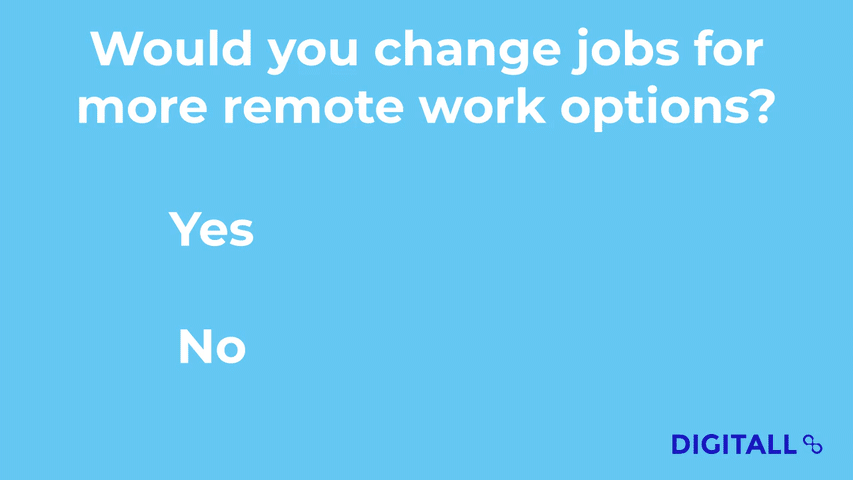2 min read
Why Customer Experience Is Becoming the Ultimate Competitive Edge
Products can be replaced, prices can be compared, but experiences last. In the chapter “Customer...
By Juliane Waack on 03.08.2022

5 min read
If you ask whether companies should offer remote work options or not, you're already too late - employees are willing to leave a company that doesn't offer flexible working models.
Content:
According to our Linkedin survey, the office as only work model is outdated and unpopular. Only 6% of participants prefer to go to their office on a daily basis.
In our own survey, 40% of participants would prefer to work from home full-time and 54% like to mix it up, deciding on their own whether they want to stay at home or work in the office.
.gif?width=853&name=work%20survey_how%20do%20you%20like%20to%20work_gif-480p-220725%20(1).gif)
Even though many companies still treat the office as standard, employees have seen how flexible workplaces can optimize their productivity and quality of life and refuse to go back.
Many decision makers still feel conflicted about remote work, though. This is due to a rather outdated belief that people at home are less productive. In reality, it's more the fear of losing control which is based on the false assumption that team leaders and decision makers apparently have more control over people who are in the same room as they are.
A comprehensive global survey with more than 10,000 participants even revealed that C-suite management reports that they have been more productive during the pandemic (and working from home) but at the same time feel that employees need to be in the office to be productive (source: ivanti). The logical conclusion is not that managers are more disciplined at home but rather that the office myth needs to be retired.
The Annual Work Trend Index Report from Microsoft 2022 showed that 50% of surveyed companies plan or already require their employees to be back in the office full-time.
But both Microsoft's and our own survey conclude that the question isn't whether employees want to return back to the office or not. Instead, they need to develop flexible working models to keep their staff.
To summarize: Despite decision makers trying to get employees back to the office, employees prefer remote work and hybrid work.
Employers who are still unsure whether to offer remote work options should act fast because the job market is changing. According to our survey, 86% of all participants would change their job if a new workplace offers remote or hybrid work. This means that the majority of employees are taking work models into account when they interview for jobs and when they decide on their future in a company or organization.

According to McKinsey, every fifth employee of the entire global workforce could work remotely three to five days a week without any decrease in productivity. Of course, there's still plenty of jobs that demand a physical presence (e.g., the service industry, manufacturing, healthcare, etc.) but almost all office jobs can be made available remotely with the right collaboration platforms and sharing tools in place.
Even more so, studies have shown that companies that had a high digital level when the pandemic hit, where much better equipped to deal with the disruption. A global survey conducted by Staufen Digital Neonex in August 2020 found out that the surveyed digital leaders were more likely to stay flexible, continue their business and keep making decisions during the shutdown.
To summarize: a digital business is not only better equipped to offer remote and hybrid working models but these working models also support a generally higher level of flexibility and security during crisis.
There is ample evidence that managers see an office's purpose differently than their employees do (read more here). Employees very often go to the office to meet colleagues, clients, and partners or need access to the right tools and data. Management, however, thinks the office is necessary to increase production and preserve corporate culture.
However, with the right tools and a change in corporate philosophy, hybrid and remote work could meet all these requirements. Centralized platforms for communication and collaboration not only enable employees but also create digital spaces for a corporate culture. Productivity increases when everyone is connected and can work with the necessary information no matter their location.
In fact, the traditional offices create big data silos by favoring paper or localized files over shareable and centralized file options. Likewise, efficient, creative, and trustful collaboration should not be dependent on a single meeting room. Nowadays, virtual platforms offer plenty opportunities to chat, call each other or see each other in video meetings.
According to a 2021 study by Salesforce and Forrester, 57% of executives struggled to maintain their customer experience due to CRM systems that were not adapted to the requirements of remote work (which was necessary during the pandemic). However, it's not remote work that's the problem. It's an IT environment that is not flexible, collaborative, and secure enough to ensure that every single employee can do their best no matter their location.
The global ivanti study showed that every second employee is frustrated by their work technology. 1 out of 4 has considered quitting their job because the tech is insufficient and 65% think they would be a lot more productive if they worked with better technology. This is not an issue of remote work or office desks. Obviously, there's a dissonance between the requirements of employees and the infrastructure of the companies.
One of the reasons is the lack of priority that employee experience receives within companies. 62% of C-level management puts profitability over employee experience. However, employee experience is almost always closely tied to productivity which in turn affects profitability. The cultural change that is happening among employees apparently still needs to reach the decision makers, so the digitalization is not only seen as something that supports customer journeys and reduces costs but also optimizes employee journeys.
To summarize: As long as decision makers refuse to accept remote and hybrid work as important assets, they will not prioritize investments into digital employee experiences which will not only hurt productivity but also increase loss of their workforce.
Microsoft Dynamics 365 offers a workplace environment that has it all: a collaboration platform for team work, virtual meetings, and real-time collaboration, data sharing, planning tools, and AI-supported applications to automate processes. Provide your employees with the right tools that fit individual work styles without compromising company standards.
Juliane Waack is Editor in Chief at DIGITALL and writes about the digital transformation, megatrends and why a healthy culture is essential for a successful business.
by Sabine Kirchem
Products can be replaced, prices can be compared, but experiences last. In the chapter “Customer...
by Sabine Kirchem
Customer Relationship Management (CRM) is no longer just a technical discipline but revolves around...
by Sabine Kirchem
There's loads of data out there – but are we truly utilizing it? And more importantly, are we using...